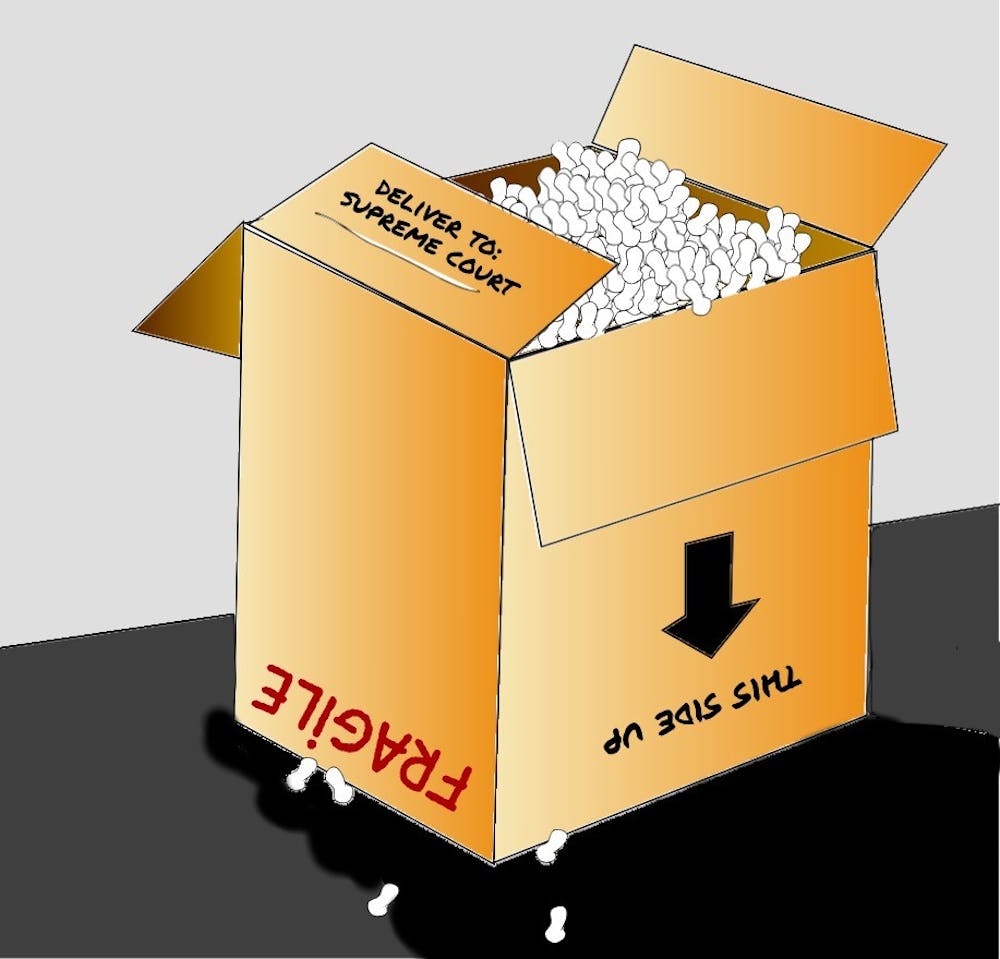Just two days after Brett Kavanaugh was narrowly confirmed to the Supreme Court, 198 Princeton students shuffled into McCosh 50 for a history lecture on Roosevelt’s attempted court-packing plan in 1937. As Professor Kevin Kruse began his lecture, the irony was lost on no one.
A Supreme Court with an Associate Justice Brett Kavanaugh is an illegitimate one. Between his dangerous understanding of executive power, the credible allegations of sexual assault and harassment against him, his clear partisan biases, and his disrespect towards sitting United States Senators, Kavanaugh is unqualified to sit on the highest court in the land.
Kavanaugh has replaced Anthony Kennedy, the “swing vote,” and provided the conservative bloc a reliable, fifth majority vote. His votes will enable the only unelected branch of government to entrench corporate power, stymie progressive legislation, and deny basic liberties to women, religious minorities, and immigrant groups for decades to come.
There is one obvious remedy: impeachment. Impeachment of a Supreme Court justice has only occurred once, in 1804. It requires a majority vote in the House of Representatives, and a supermajority (a two-thirds majority) in the Senate for conviction.
Democrats are primed to take back the House this fall during the midterms elections, and it is not difficult to imagine a simple majority strong enough to impeach Kavanaugh. However, in the Senate, Democrats are likely to lose seats due to the odd composition of Class I Senators, and Kavanagh's conviction would require many — at least 18 — of the same senators who just voted for his confirmation to flip against him. This renders impeachment to be nearly impossible.
Yet, if Kavanaugh cannot be removed from the Court, his voice can be drowned out by the addition of more justices.
All it takes is a simple act of Congress to expand the Supreme Court.
Roosevelt was inspired to pack the Court in 1937 after he won a sweeping reelection in 1936 and the Supreme Court had found many central elements of the New Deal unconstitutional. His push to pack the Court would have expanded the Court by six seats, growing the Supreme Court to 15 justices.
The rationale he provided was three-fold. Firstly, he believed the Court was overworked and its docket was too large for merely nine justices. Secondly, he argued that “the Court has been acting not as a judicial body, but as a policy-making body.” The last leg of Roosevelt's stool was that “the number of Justices has been changed several times before, in the Administrations of John Adams and Thomas Jefferson, both signers of the Declaration of Independence, Andrew Jackson, Abraham Lincoln and Ulysses S. Grant.”
Roosevelt’s campaign for reform died in the summer of 1937, and the Court was never expanded. However, many of his arguments still stand strong today.
The Roberts Court, much like the Hughes Court of 1935, has been in the business of legislation, not jurisprudence. Its expansive understanding of the Second Amendment in District of Columbia v. Heller serves as a barrier against common sense gun reform; its contorted definition of the First Amendment and free speech in Citizens United v. Federal Election Commission enables essentially unlimited campaign contributions by the billionaire class; Shelby County v. Holder guts central provisions of the Voting Rights Act of 1965.
And there is precedence for the Court expanding. There is nothing sacred about “nine;”the number is not prescribed by the Constitution. In one 70-year period (1801-1869) the size of the Court was changed six different times.

There are no guarantees in politics, but Trump’s unpopularity has opened doors for Democrats in 2020 to take back the House, Senate, and White House. Some have gone so far as to say that adding two seats to the Supreme Court should be a litmus test for any 2020 nominee. I agree.
It’s time to pack the Court.
Zachariah Sippy is a first-year from Lexington, Ky. He can be reached at zsippy@princeton.edu.









